Accidental exposure to pesticides can have serious health implications and is a major health concern all over the country. While many types of pesticides can be used with relatively little risk, some can be extremely toxic and can cause negative impacts on a person’s health over time. Using the proper safety equipment and wearing protective clothing when applying or handling pesticides can reduce the risk of pesticide poisoning. Because exposure is reduced, the risk of pesticide poisoning is also reduced. But professionals who are regularly exposed to these toxic chemicals tend to be at a higher risk of developing a pesticide-related illness due to ongoing exposure, even when following safety precautions.
Pesticides and Human Health
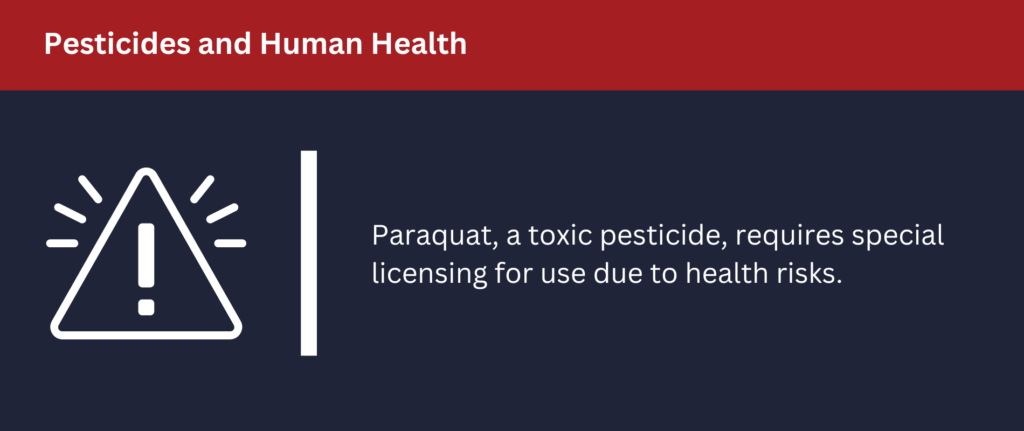
All pesticides are toxic, but some can be so harmful that they can require special licensing to use. One such toxic pesticide is paraquat. According to the U.S. Environmental Protection Agency, paraquat is classified as restricted use. This means the product can only be used by licensed pesticide applicators, due to the serious health risks linked to long-term exposure. Unfortunately, this product is still widely used in the U.S.
Understanding the toxicity of a pesticide and the potential for exposure can minimize risk. Regardless of how toxic a pesticide is, if the level of exposure is kept low, the risk can also be lowered. Unfortunately, a pesticide’s toxicity level cannot be changed.
Routes of Exposure
A pesticide can enter the body in a few ways:
-Absorption through the eyes or skin
-Through the mouth
-By breathing the pesticide into the lungs
Exposure through the eyes or skin can continue as long as the pesticide remains in contact with the eyes or skin. The rate of absorption exposure can depend on the area of the body affected. It’s also very easy to transfer pesticide residue from one part of the body to another. Once this occurs, there is an increased potential for pesticide poisoning.
Oral exposure can result in severe injury, serious illness, or death if the pesticide is swallowed. A pesticide can be ingested intentionally, through carelessness, or by accident.
The lungs can be exposed to pesticides by inhalation of vapors, airborne droplets, or powders.
Acute Pesticide-Related Illnesses
Acute toxicity of pesticides refers to the product’s ability to cause injury to a person from a single exposure. The adverse effects that result from a single exposure, regardless of route, are referred to as acute effects.
Acute Occupational Pesticide-Related Illness
Nadrich Accident Injury Lawyers
800-718-4658
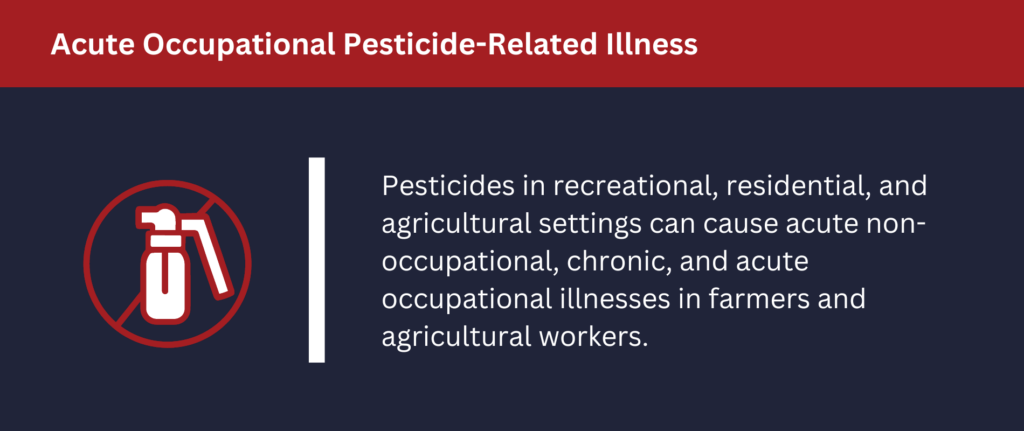
Pesticides are commonly used in recreational, residential and agricultural settings. Because of this, acute non-occupational pesticide-related illnesses can occur due to a person’s exposure to pesticides in these everyday environments. A person can be exposed to low levels of pesticides in a variety of settings including hospitals, schools, and homes. Because these chemicals are toxic, exposure can cause chronic or adverse health effects. Acute occupational pesticide-related illnesses are common among farmers and agricultural workers who are exposed to chemical pesticides on a regular basis.
Long-term Health Effects and Pesticide-Related Illnesses
Over an extended period of time, the harmful effects of exposure to toxic chemicals can result in serious illness. Long-term exposure to pesticides has been linked to the development of ADHD, depression, anxiety, asthma, Parkinson’s disease, non-Hodgkin’s lymphoma, and leukemia.
When a person has been exposed to a pesticide over a long period of time, it’s hard to determine if their disease or illness is due to the adverse health effects of pesticide exposure.
Many of the long-term effects of pesticide exposure can be difficult to see because people in farming areas are often exposed to a variety of chemicals and because agricultural workers can move from place to place.
When a person develops Parkinson’s disease, cancer or other diseases, scientists and doctors may say the illness was due to problems other than pesticide or herbicide exposure. Most manufacturers that promote or sell pesticides will lie about the harm pesticide exposure can cause since they don’t want to be held liable for a person’s health problems.
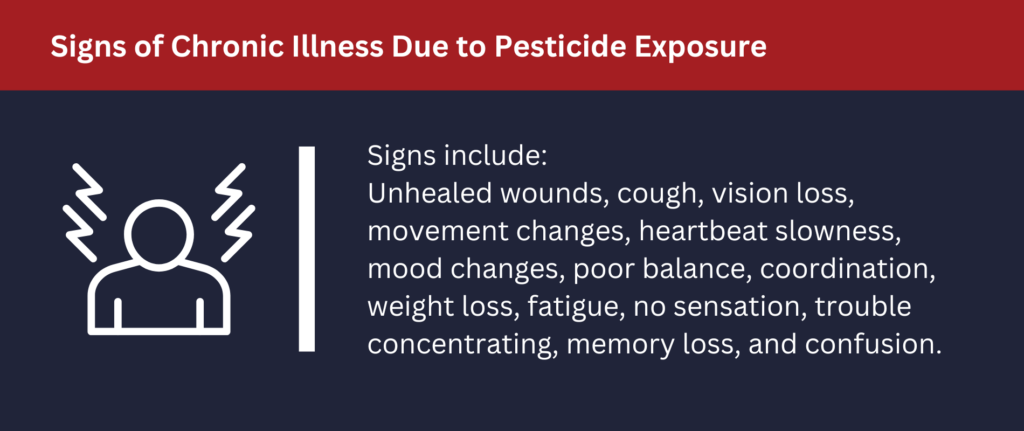
Some signs of chronic illness due to pesticide exposure can include:
- Wounds that don’t heal
- Constant cough
- Loss of vision
- Changes in movement
- Slow or fast heartbeat
- Sudden changes in mood
- Poor balance and/or coordination
- Weight loss
- Fatigue
- No feeling in feet or hands
- Trouble concentrating
- Memory loss
- Confusion
If you have any of these signs and have been exposed to pesticides, you must schedule an appointment with your doctor as soon as possible.
Some of the long-term effects of pesticide exposure can include:
Lung Damage
People who have been exposed to pesticides may develop a chronic cough that never goes away. They may also have a tight feeling in their chest. This can be a sign of asthma, bronchitis or another lung disease. Damage to the lungs can develop into lung cancer over time.
Cancer
People who have been exposed to pesticides have a higher chance of getting cancer compared to people who have not been exposed. Hundreds of harmful chemicals are believed to cause cancer. However, many have not been studied. The most common cancers caused by pesticides are brain cancer, non-Hodgkin’s lymphoma, and leukemia.
Liver Damage
The liver cleans the blood, removing toxins. Because a pesticide is a strong poison, the liver may be unable to get rid of it. Severe damage to the liver can occur after working with pesticides for several months or after serious poisoning.
Toxic Hepatitis
This is a type of liver disease that can occur from pesticide exposure. It can destroy the liver and cause yellowing of the skin, fever, vomiting and nausea.
Nervous System Damage
Pesticide exposure can also damage the nervous system, resulting in trouble concentrating, mood changes, anxiety, loss of memory, or the development of Parkinson’s disease.
Immune System Damage
Some pesticides can weaken the immune system. When the immune system is weakened, it’s easier to get infections and allergies, and the body will have a harder time recovering from an ordinary illness.
Reproductive Health Issues
Pesticides can have many of the same effects on the reproductive system as other types of toxic chemicals. When pesticides enter a woman’s body, they can appear in her breast milk several hours later. There have also been reports that show exposure to pesticides can lead to sterility in men.
Exposure in Children
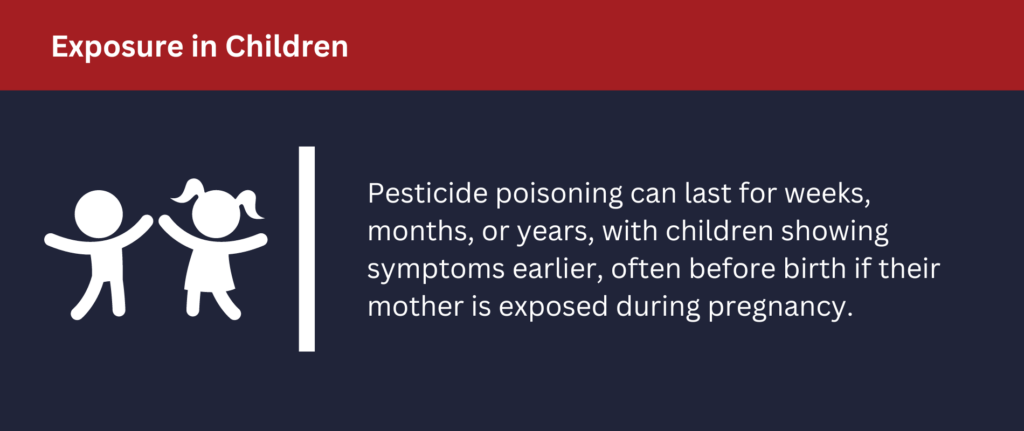
Most pesticide poisoning comes from contact with pesticides over several weeks, months, or years, not just from a single exposure. While it can take an adult 5-30 years or more to get sick from regular exposure, it takes much less time to show up in children. Illness due to pesticide exposure can begin in infants before birth if their mother is exposed to pesticides during her pregnancy.
Environmental Exposure
An environmental illness can occur when a person is exposed to toxins in their natural environment that make them sick. These hazards can be found in our everyday lives, even where a person lives, works or plays.
In many cases, exposure to certain toxic chemicals can cause adverse health effects. The more chemicals a person is exposed to, the more likely they are to become ill. This is a major health concern for agricultural workers, farmers and other professionals who work around toxic chemicals daily.
Examples of exposure include:
- Exposure to pesticide products, such as paraquat
- Chemicals in cigarettes are known to cause lung damage. When a person smokes inside the house this type of indoor air pollution can severely harm all members in the home.
- Indoor air pollution from wood-burning stoves can produce smoke that causes breathing problems, such as asthma in rooms and homes without adequate ventilation
- Unsafe drinking water from water sources that are polluted with pesticides can cause cancer, allergies or other problems
Symptoms of an environmental illness can depend on the root cause. The symptoms can be similar to those you can experience with other conditions.
Examples of symptoms include:
- Rash
- Muscle aches
- Chronic cough
- Fever and chills
- Headache
If you believe the cause of your illness is related to pesticide exposure, contact your doctor immediately. Your physician will discuss your exposure history and symptoms, and will need to obtain information regarding your work environment. For example, if you regularly work in agricultural fields, you are at a higher risk of developing a pesticide-related illness or another type of environmental illness.
Can Paraquat Exposure Make You Sick?
Research has found that pesticide exposure can cause chronic health effects. Paraquat, a powerful herbicide commonly used by agricultural workers and farmers, can cause Parkinson’s disease, according to some studies. Parkinson’s disease is a progressive neurodegenerative disease that can cause balance and movement problems, muscle stiffness and rigidity, depression, and memory problems. This disease is progressive and there is no cure.
Pesticide-Related Illness and Injury Cases
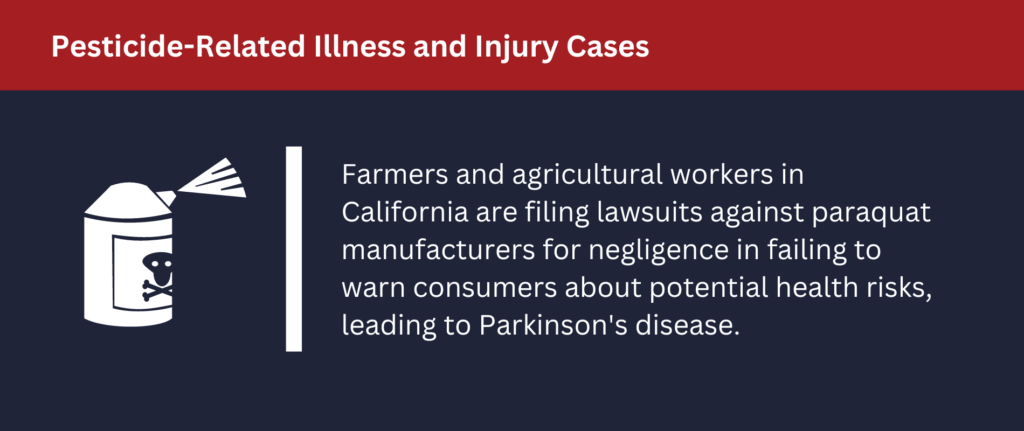
Farmers and other agricultural workers who have been exposed to paraquat and developed Parkinson’s disease have filed California paraquat lawsuits to hold the manufacturers of paraquat responsible for their negligence and failure to warn consumers of the dangers associated with use. Unfortunately, Parkinson’s disease is a progressive, lifelong disease that requires costly medical treatment. If you were diagnosed with Parkinson’s disease due to paraquat exposure, or another type of pesticide-related illness, you must contact an attorney as soon as possible. An attorney can file a lawsuit on your behalf to hold the negligent manufacturer responsible for your past and future medical costs, pain and suffering, and other damages.
Contact A Paraquat Lawyer Today at Nadrich Accident Injury Lawyers
If you have been exposed to pesticides, such as paraquat, and developed an illness, the manufacturer of these toxic chemicals must be held responsible for the harm they have caused. If you were diagnosed with Parkinson’s disease due to paraquat exposure, contact Nadrich Accident Injury Lawyers today at 800-718-4658 or text or email. We offer free, no-obligation case reviews. We can meet with you to discuss your case and help you explore your legal options. If you decide to work with us, we will get started right away, investigating your case, gathering vital evidence and building the strongest case possible to prove the manufacturer must be held accountable. Contact our paraquat lawyers today and let us help you seek justice and the compensation you deserve.

